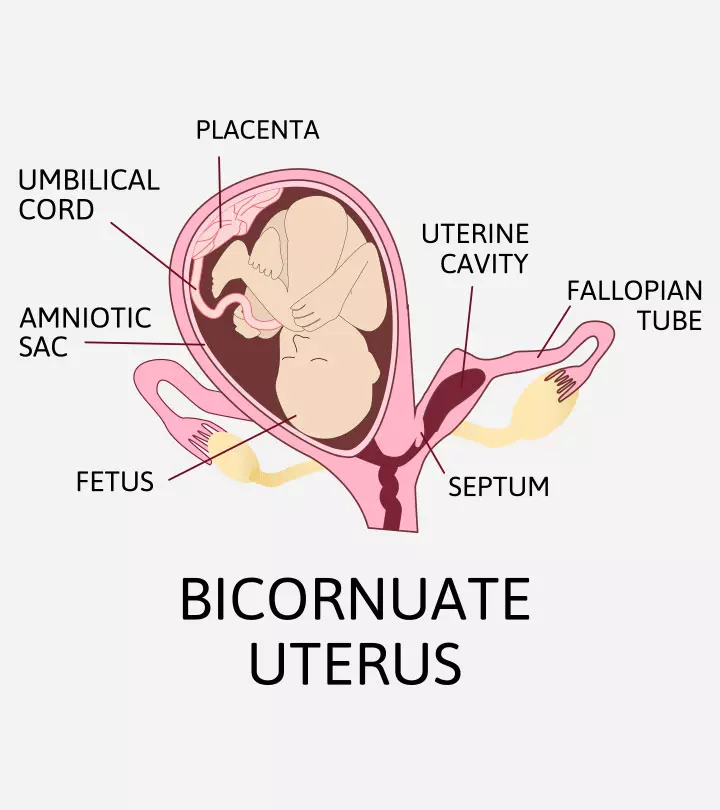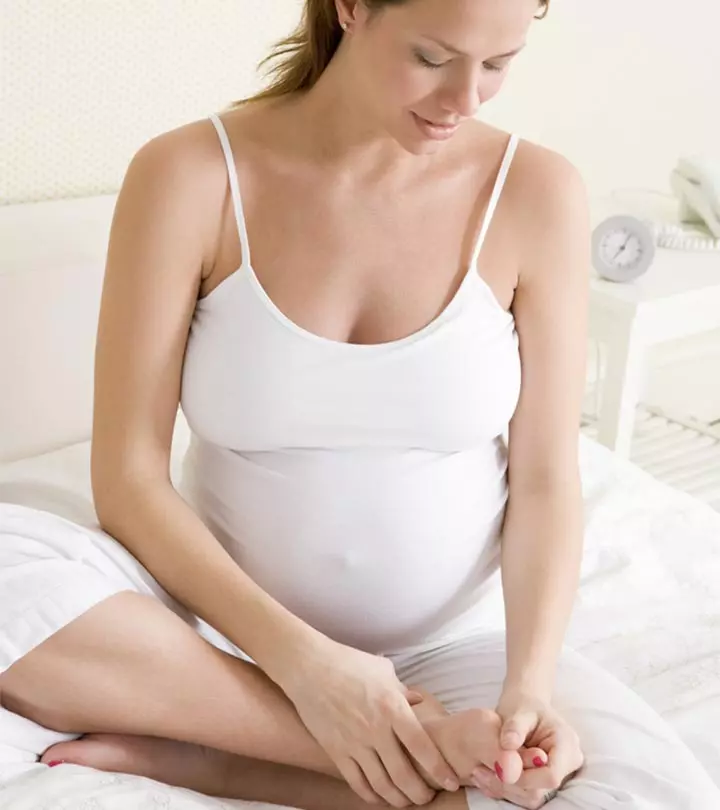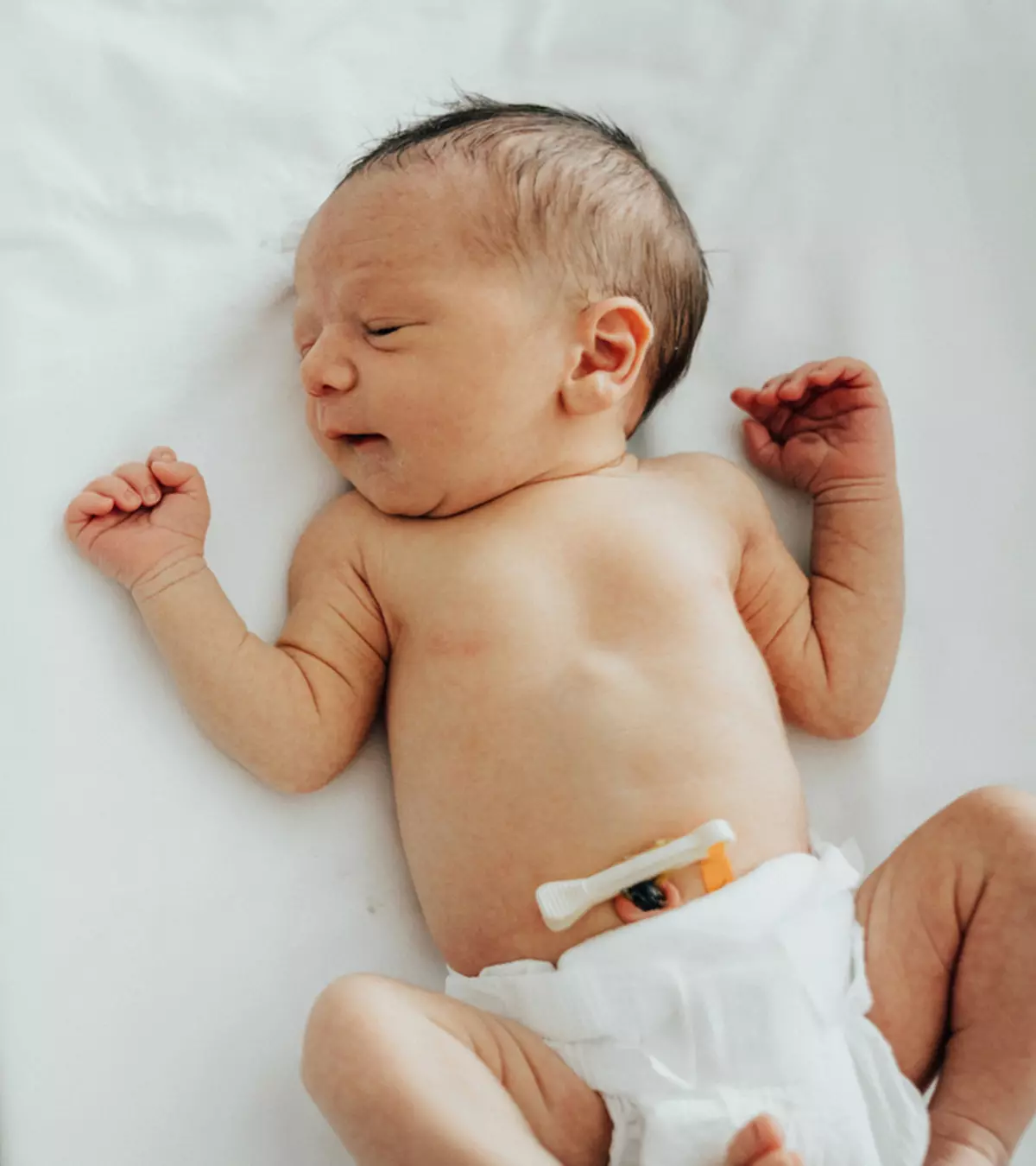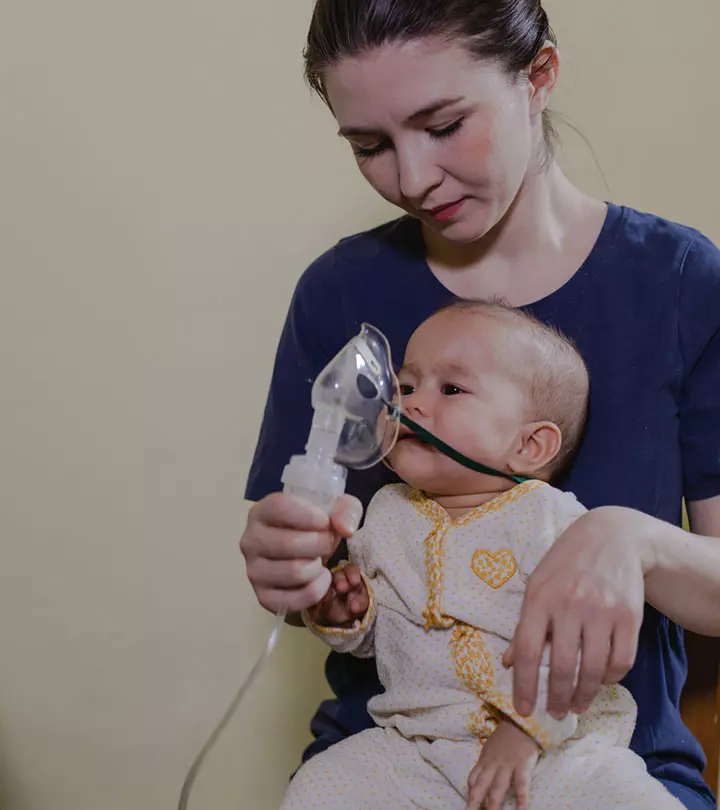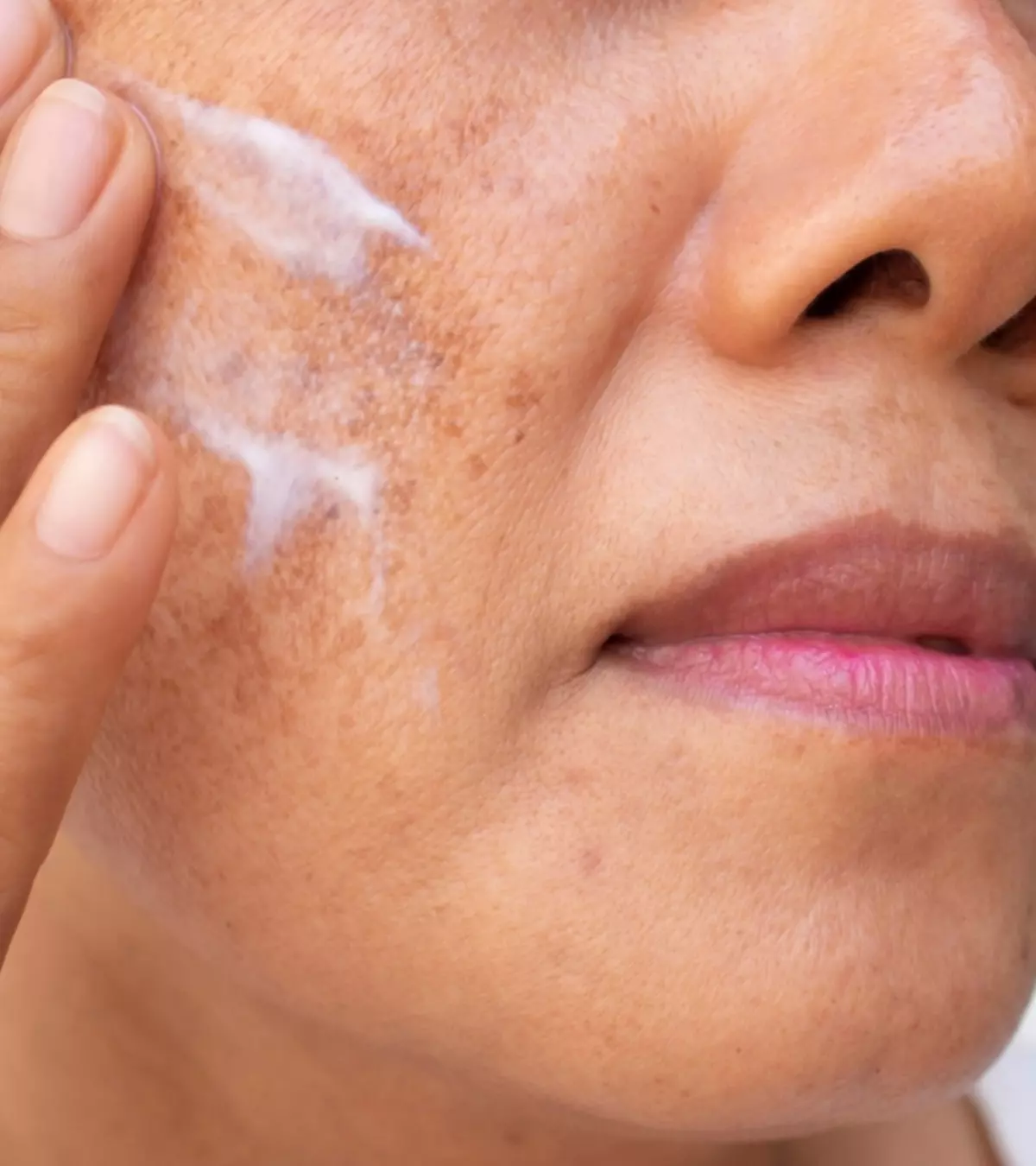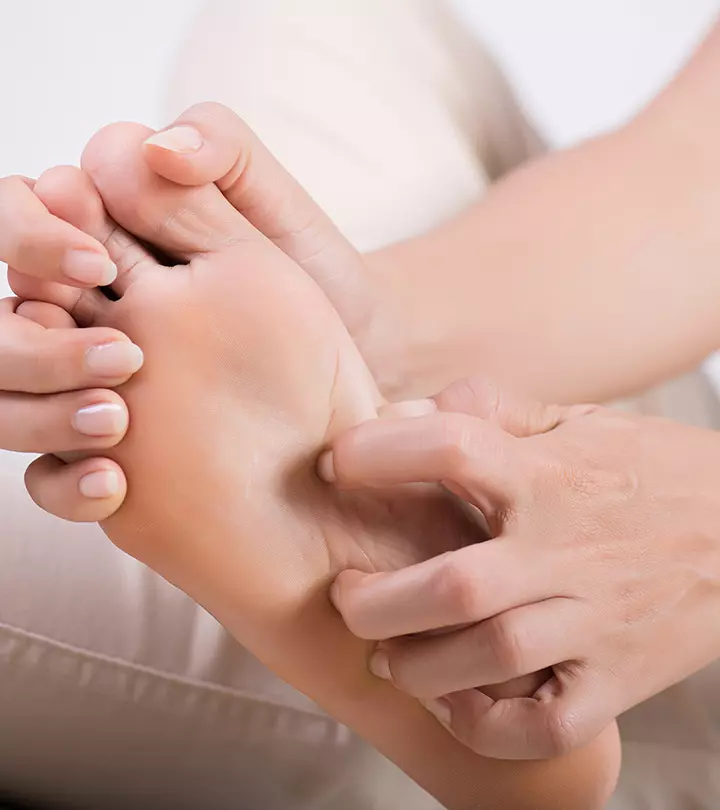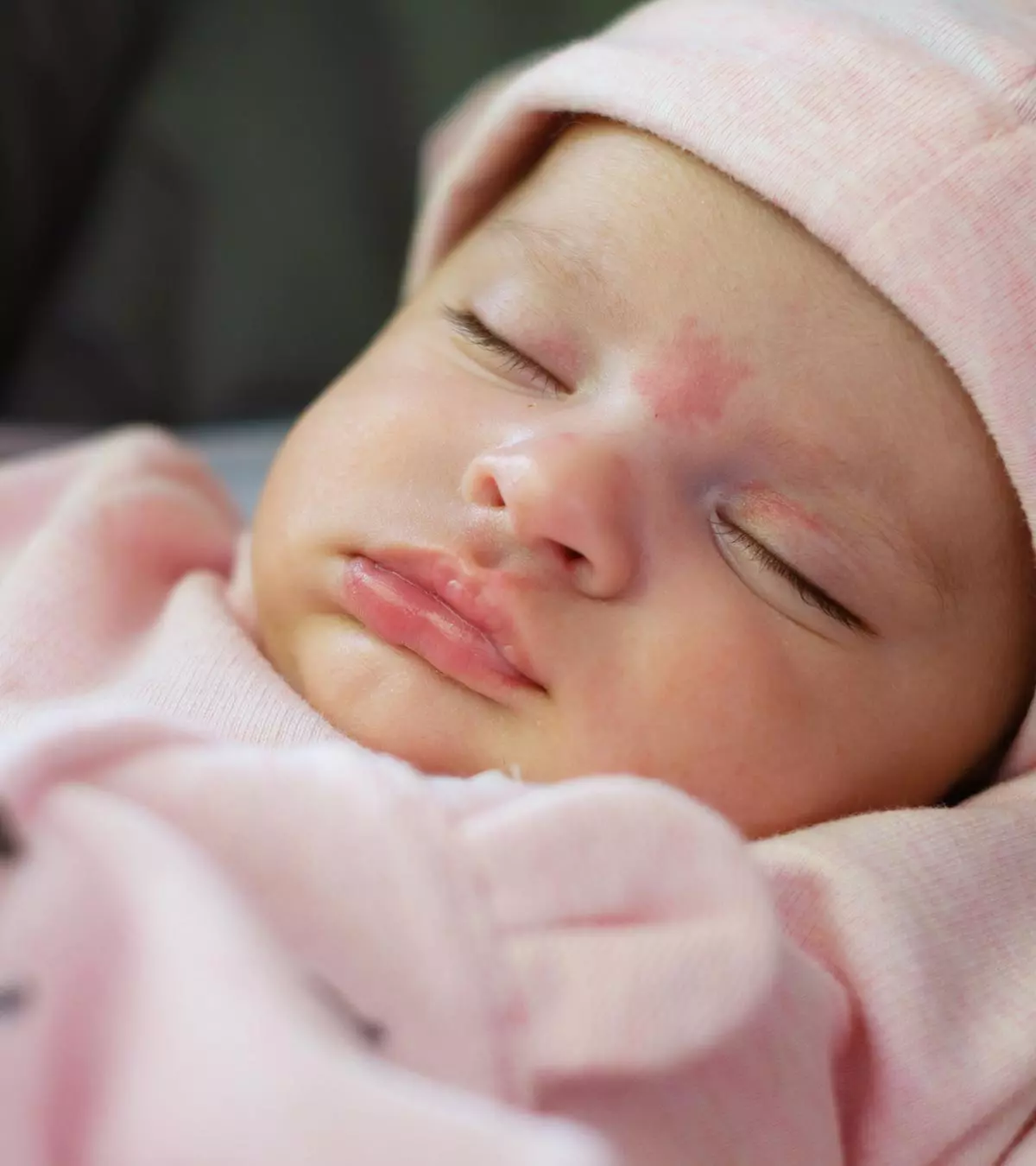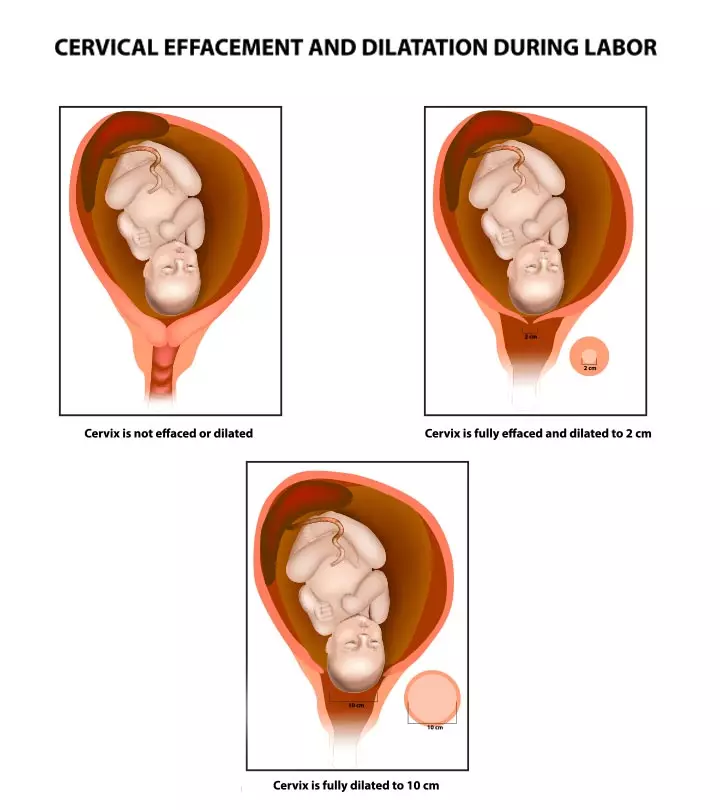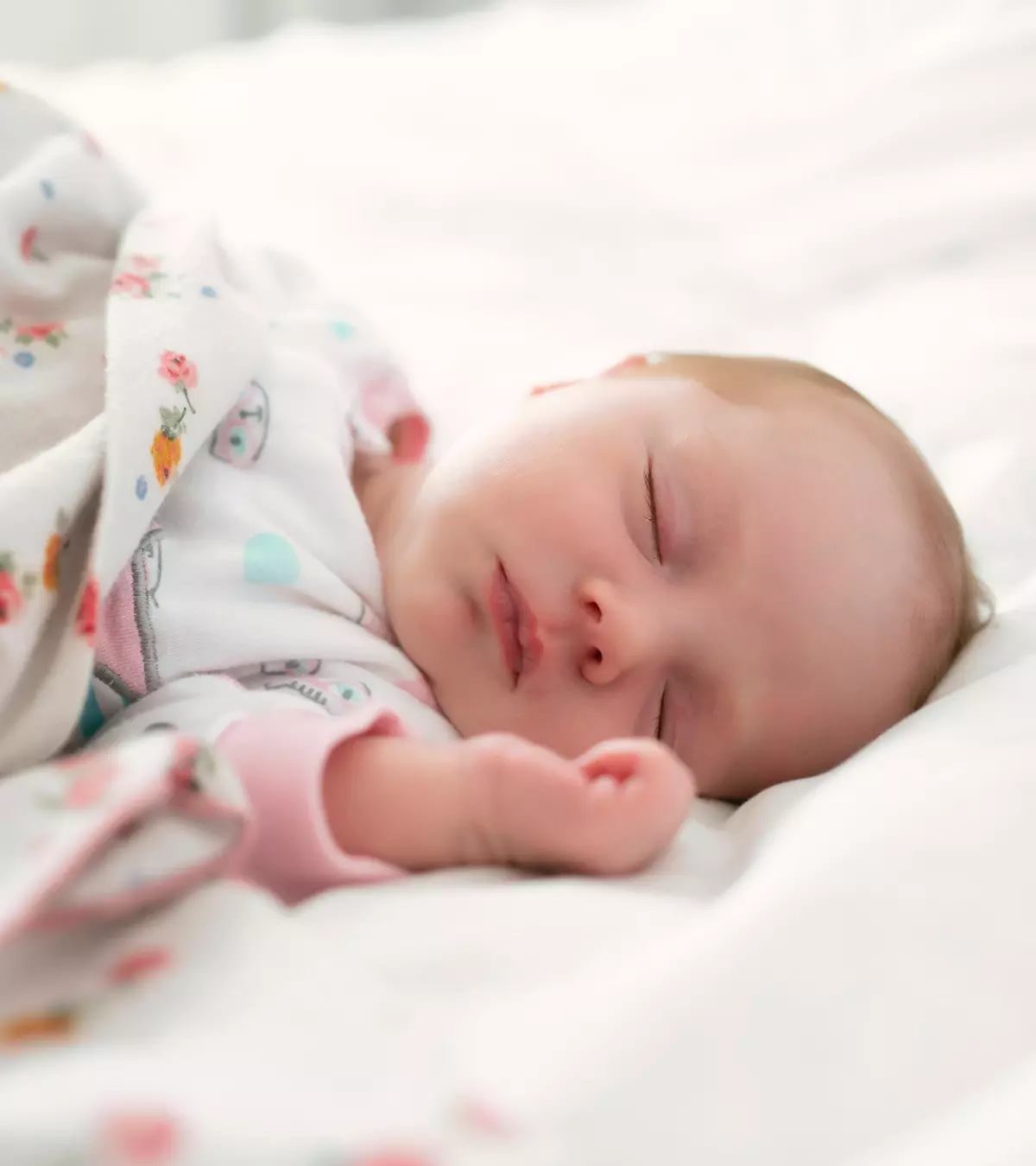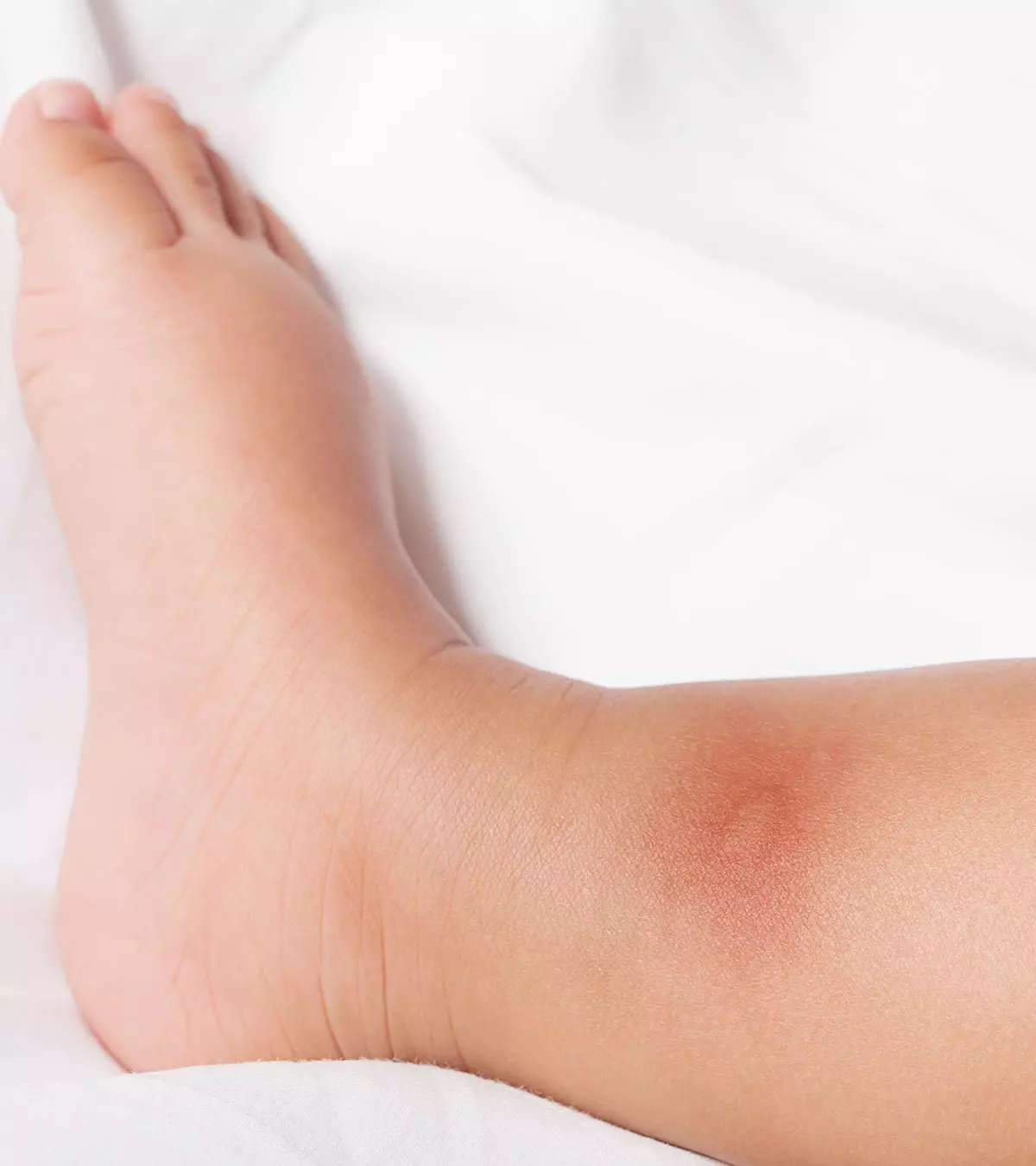
Bedbugs, the tiny nocturnal parasites, are typically found in the narrow crevices of rooms or objects such as tables, beds, and windows. Do not be alarmed if you happen to notice bedbug bites in babies. They create more of an annoyance than health problems. The bites appear in red clusters and are mostly treatable with topical application of ointments. Although harmless, the continuous itching and scratching may lead to an infection.
Read on to know about baby bedbug bites, including their treatment and steps to prevent them.
Key Pointers
- Bedbugs may cause itching and allergic reactions, but their bites are not dangerous.
- If your baby develops a fever, redness, abscess, swelling, or difficulty breathing after being bitten, seek medical help.
- Topical lotions, ointments, corticosteroids, or antibiotics are used to treat bedbug bites.
- To avoid bedbugs, check rental cars or rooms before using them, vacuum furniture and upholstery, and wash clothes and upholstery with hot water.
- If your house is infested with bedbugs, seek professional help instead of using OTC insecticides, which may harm your baby.
What Are Bedbugs?
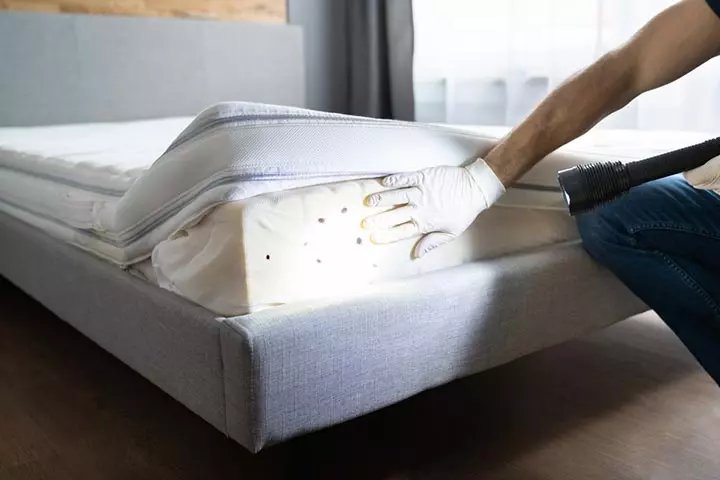
Bedbugs (Cimex lectularius) are small, flat, nocturnal parasites that survive on human blood. Bedbug infestation is common in places like hotels, shelters, dorm rooms and public transport vehicles. Bedbugs hide in mattresses and other dry and warm places such as dressers, wall crevices, bed frames, rugs, and window casings (1). After a blood meal, the bedbugs don’t stay on the skin but instead hide in the aforementioned locations, which allows them to be transported and spread to new locations. Babies and toddlers whose parents frequently travel and stay in hotels or live in old apartments and buildings with poor sanitation practices are at greater risk of getting bed bug bites (10).
Do Bedbug Bites On Babies Cause Health Risks?
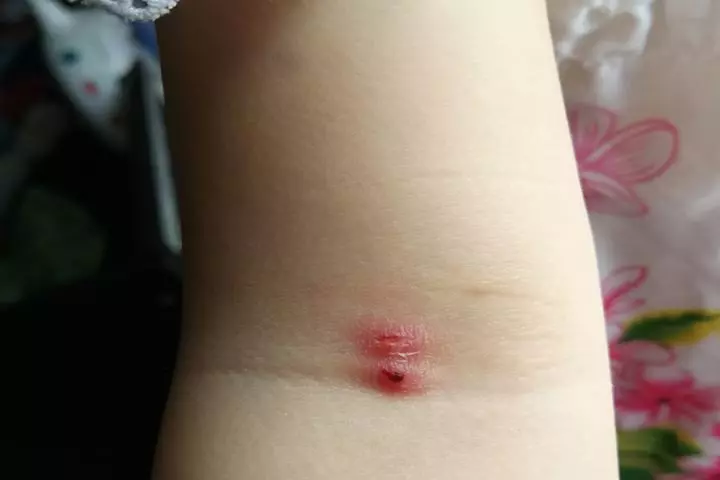
Bedbug bites do not require medical attention as they are mostly painless. However, these nasty bites may cause itchiness, and scratching them can lead to secondary infections. The bedbug bites usually appear in clusters or a line formation and hence are distinguishable from mosquito bites. If you notice red marks in clusters on your baby’s delicate skin, it is time for inspecting his bedding for any bug infestation (2).
Bedbug bite reactions may be different for every baby. Some may not feel any pain at all while others may suffer from skin irritation, mild to severe itching and even allergic reactions such as a rash. The severity of your baby’s reaction to bedbug bites may determine the course of treatment he requires (1).
Bedbugs do not spread diseases, so their presence is not a health hazard but more of a nuisance. Babies may scratch the affected area with their fingernails and develop infections or may cry incessantly due to discomfort caused by the bites. Babies may also suffer from a loss of sleep and may even become irritable due to an infestation of bedbugs (1). A severe case of bedbug bites may result in scarring to the baby’s delicate skin. Do seek immediate medical help if your baby suffers from the following symptoms:(3)
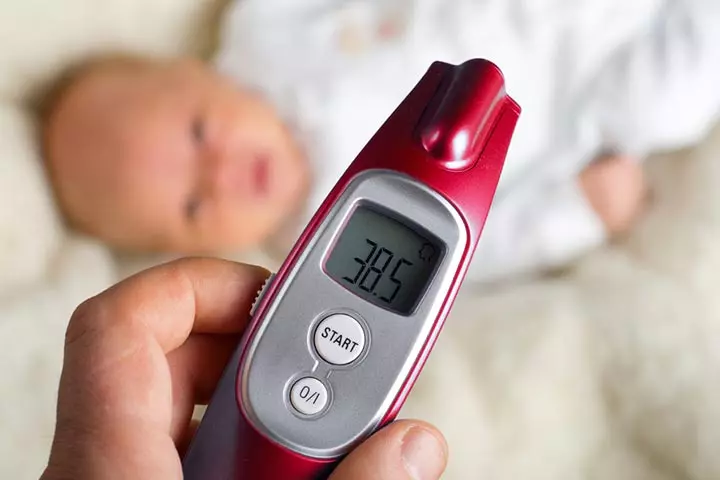
- If they develop any redness, abscess or swelling in the affected area.
- If your baby runs a fever after suffering from bedbug bites.
- If they suffer from any breathing difficulty due to an allergic reaction caused by the bug bites.
How To Treat Bed Bug Bites On Baby’s Skin?
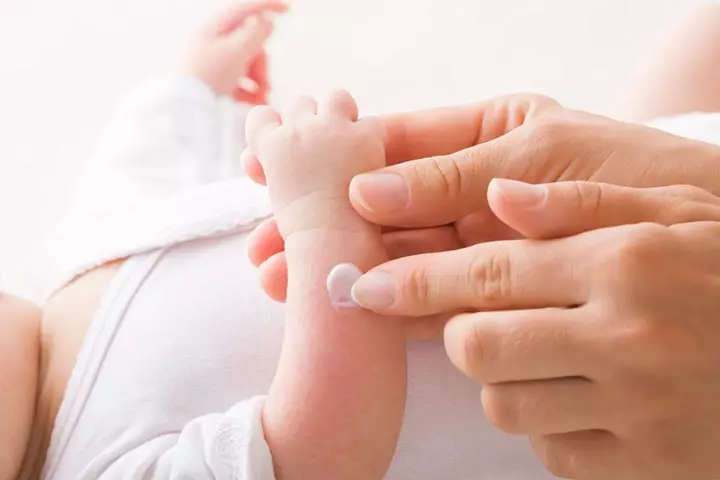
Consult your baby’s doctor if you notice bed bug bites on the baby’s skin. The pediatrician may prescribe a mild antiseptic lotion for topical application to provide relief to your baby. Corticosteroid ointments and creams for itching are popular medications for treating bedbug bites. If the bug bites in babies are severe, the doctor may also prescribe oral corticosteroids. If the bug bites are severe, the doctor may also prescribe oral corticosteroids. If your baby develops a bacterial infection due to scratching the bug bites, a course of antibiotics may be needed (4). You can also use home remedies like aloe vera gel to alleviate and soothe your baby’s itchy skin.
 Quick tip
Quick tipTips To Prevent Bedbugs
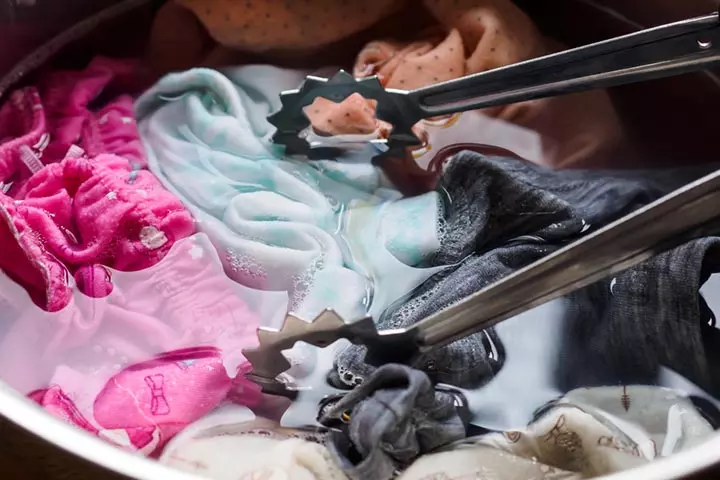
Bedbugs are about the size of an apple seed, and their eggs are even smaller, so it is difficult to spot them or identify their hiding places. Apart from the bites, you can notice signs of bedbugs through tiny blood stains on mattresses, upholstery, and sheets. You can also confirm the presence of bedbugs if you spot rusty or dark fecal deposits or exoskeletons on the mattress. An offensive, sweet, musty odor is also a sign of severe bedbug infestation (4). Consider the following measures to keep the threat of a bedbug infestation at bay (5).
- While traveling, check rental vehicles for bedbugs before using them. When you stay in hotels, keep your luggage away from your bed and off the floor. Try to place them on a luggage rack or even on a desk in the room.
- Refrain from using used upholstery or furniture. In case you decide to do this, thoroughly vacuum them beforehand to get rid of bedbugs.
- Use hot water to wash all clothes and upholstery regularly to eradicate any bedbug infestation and maintain cleanliness.
- Following good hygiene practices such as regularly washing bedding and vacuuming carpets can help prevent bed bug infestations from spreading.
- Inspect the baby’s room for signs of bed bug infestation, especially around the crib, to ensure the safety and comfort of your child. The National Pest Management Association (NPMA) suggests that bed bug bites are the most common sign of a bed bug infestation, almost 92%, as revealed by the 2018 Bugs Without Borders research. Thus, make sure to take the proper precautionary measures.
 Quick tip
Quick tipSeek professional help to get rid of bedbugs in your house. Over-the-counter insecticides may harm your little one, so it is best to leave the task to pest control companies.
Frequently Asked Questions
1. Where do bed bugs most commonly bite?
Bed bugs tend to bite on the exposed areas of the skin, such as the neck, arms, face, and hands (6).
2. Do bed bugs go away by themselves?
No, bed bugs will not go away, and you may have to take the help of pest control or DIY tricks to stop their spread (7).
3. What are the long-term effects of bedbug bites on babies?
Bedbug bites on babies often cause temporary skin irritation and itching. However, in rare situations, they may cause severe allergic reactions or secondary infections due to persistent itching (1).
Although bedbug bites in babies, seen as a cluster of red marks on their skin, do not necessitate medical treatment, the itching and scratching may irritate your baby and cause secondary infections. The mild antiseptic lotion is usually sufficient for symptomatic relief, but certain severe cases and resulting secondary infection may necessitate oral corticosteroids and antibiotics. You can also minimize clutter in the house to keep your baby safe from bedbug bites.
Infographic: Strategies For Prevention And Management Of Bedbugs
Bedbugs are a nuisance not just for adults but for babies too. So, to avoid any potential side effects of these insects on your little one, we listed helpful measures in this infographic to prevent or manage bedbugs. Read on!

Illustration: Momjunction Design Team
Equip yourself with 10 simple and effective tips to protect against bed bugs. Learn how to fortify your home and keep it bug-free, ensuring your safety and peace of mind.
References
- About Bed Bugs;
https://www.cdc.gov/bed-bugs/about/?CDC_AAref_Val=https://www.cdc.gov/parasites/bedbugs/faqs.html - Bedbugs.
https://kidshealth.org/en/parents/bedbugs.html - Bedbugs.
https://www.nationwidechildrens.org/family-resources-education/health-wellness-and-safety-resources/helping-hands/bedbugs - BED BUGS: DIAGNOSIS AND TREATMENT.
https://www.aad.org/public/diseases/a-z/bed-bugs-treatment - Top Ten Tips to Prevent or Control Bed Bugs.
https://www.epa.gov/bedbugs/top-ten-tips-prevent-or-control-bed-bugs - How to Treat Bed Bug Bites and Other Bed Bug FAQs.
https://www.pestworld.org/news-hub/pest-health-hub/bed-bug-bites/ - 4 reasons not to ignore signs of bed bugs.
https://www.snexplores.org/article/4-reasons-not-ignore-signs-bed-bugs - Bedbugs.
https://www.nhs.uk/conditions/bedbugs/ - Bed Bug Bite.
https://www.seattlechildrens.org/conditions/a-z/bed-bug-bite/ - Adrien C. Ennis and Anthony L. Pearson-Shaver; (2023); Bedbug Bites.
https://www.ncbi.nlm.nih.gov/books/NBK538128/
Community Experiences
Join the conversation and become a part of our nurturing community! Share your stories, experiences, and insights to connect with fellow parents.
Read full bio of Dr. Regina A. Hardin
Read full bio of Jessica Albert
Read full bio of Swati Patwal
Read full bio of Vidya Tadapatri










